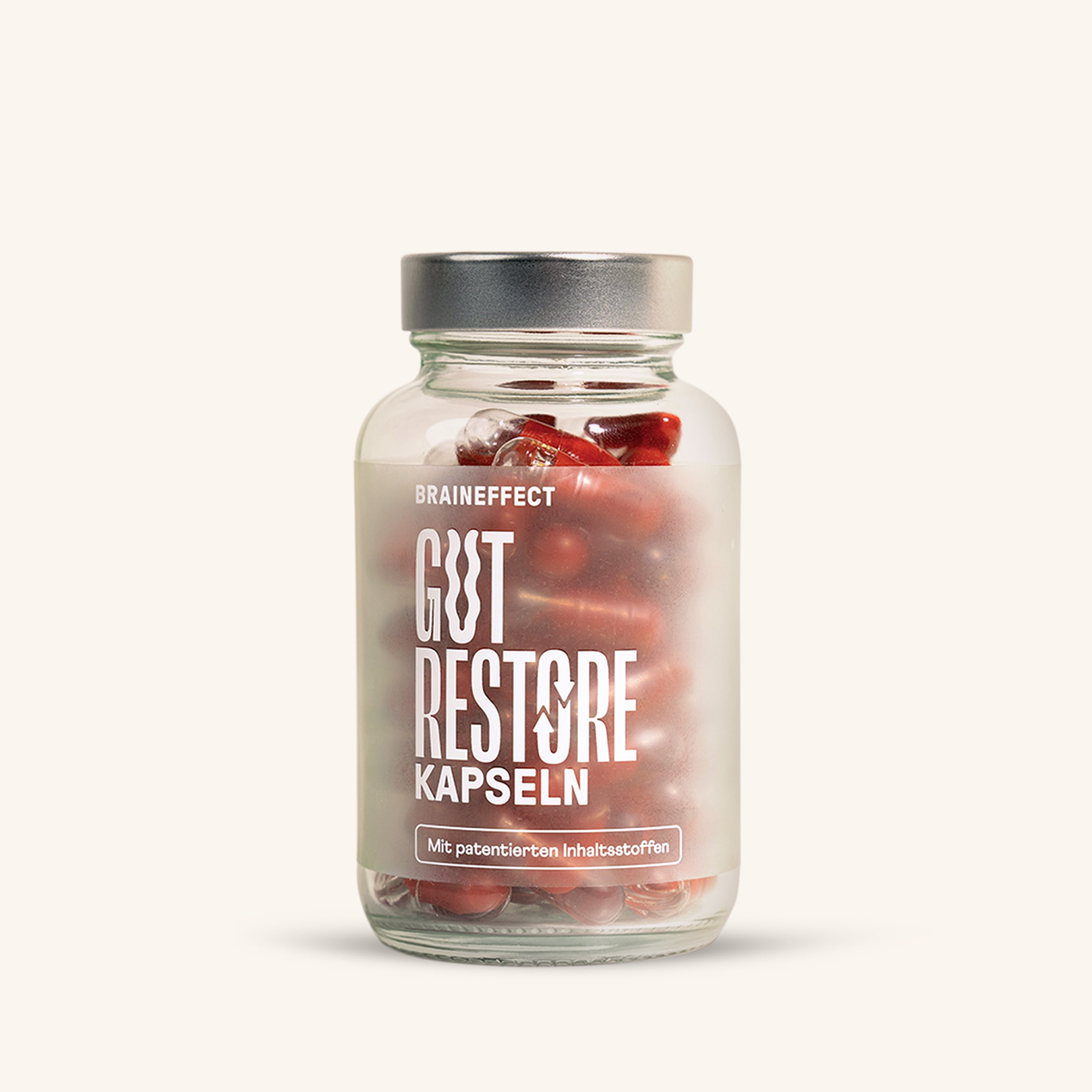Are you constantly on edge, with a racing heart and no longer able to sleep at night? If yes, an excess of the stress hormone cortisol might be responsible for this condition. Here, we show you what cortisol is and how you can counteract the effects of the stress hormone.
Cortisol does this to your body
Cortisol is a primary stress hormone, which is released from your adrenal cortex whenever you experience stress. If you are chronically under stress, the hormone is released continuously by your body. A chronically elevated level of cortisol is very harmful for your cognitive and physical health and for your well-being. In the short term, however, the release of cortisol is very helpful and serves as a form of protection for your body. In combination with the other stress hormone, adrenaline, the two hormones perform many important tasks in your body. For example, in stressful situations, they prepare you to be at the top of your game. The hormones also help the brain to utilize glucose as a source of energy. In short, cortisol serves to improve your performance. If you have to perform well in a challenging situation, first the stress hormones noradrenaline and adrenaline are released in a rapid burst. This is followed by the release of cortisol. The combination of these hormones increases your heart rate, blood pressure and has many other effects. Essentially, cortisol activates you in demanding situations. So far, so good.
The situation with the stress hormones becomes problematic only if you are chronically under stress and cortisol is being released permanently. This is because too much of the hormones can lead to a wide range of physical and psychological illnesses. An excess of cortisol is associated with hereditary diseases, high blood pressure, insomnia and malfunctions of the immune system. Chronically elevated cortisol levels are especially problematic for your brain. In such cases, the hormone damages areas in the hippocampus, the part of the brain which is responsible for learning and memory processes. A study conducted by the Department of Biological Sciences at Stanford University discovered that neuron cells get "overstimulated" by cortisol, which leads to their early aging. The generation of new neuron cells in the brain is also affected adversely. In the study, subjects with an excess of cortisol experienced issues with memory loss and had difficulty concentrating.¹
What chronically elevated cortisol levels also bring with them are sleep problems and a markedly reduced sleep quality. This is because too much cortisol does not let you fall asleep in the evening and at night it leads you to a situation where you are in a constant state of alertness. In this way you cannot get any deep sleep (which is extremely valuable) and are unable to regenerate sufficiently to start the next day with fully recharged batteries. On the contrary, bad sleep leads to an even higher stress level. Fortunately, you can reduce excess cortisol production. How does this work? Well, it's based on picking the right type of diet and physical exercise. These are the two main factors that can counteract the adverse effects of cortisol and reduce production of the hormone.
Take-Home Message #1: The stress hormone cortisol has a stimulating effect on the cardiovascular system in stressful situations and makes you more efficient in the short term. Cortisol has a negative impact primarily on your ability to concentrate and on your sleep, which, in turn, also affects your stress level.

The right diet against an excess of cortisol
Food products do not contain cortisol. However, some food products can increase secretion of the hormones. Cortisol is associated with nutrition to the extent that it has a major impact on the regulation of the blood sugar level. For example, if you consume plenty of pastry products that contain a lot of sugar, your blood sugar level and, consequently, your cortisol levels will shoot up. The higher the blood sugar level, the more cortisol is secreted for regulation of the former. Ironically, many people eat sugary foods to relax. Sugar, however, causes an increased release of cortisol and adrenaline that can last up to five hours. The combination of sugar with white flour, which is used in many pastries and sweets, jacks up the cortisol levels even further. The healthier alternative: it's better to go for whole-grain products.
And now it gets even harder. It's not just sugar that is bad for your cortisol levels: Coffee also enormously increases production of the hormone. The caffeine from coffee, energy drinks and the like stimulates the adrenal glands, which causes them to release more cortisol. Regular caffeine consumption can more than double the blood content of the stress hormone cortisol. People who do not wish to give up caffeine should switch to green tea. It only contains about a quarter of the caffeine, but at the same time the tea has a relaxing effect thanks to a special amino acid contained in it. A study by the Faculty of Health Sciences, Ben-Gurion University, has recently found out that the L-theanine amino acid counteracts cortisol production and brings down its levels in blood.² The third major factor that affects your cortisol levels: greasy fried foods. Potato chips and the like contain a large quantity of the so-called trans-fatty acids which lead to a rapid increase in cholesterol levels. Cortisol is also responsible for the regulation of cholesterol levels. Ergo: The higher the cholesterol level due to the consumed fats, the higher the level of the stress hormone cortisol.
Take-Home Message #2: Although sugar, caffeine and fried foods do not directly contain cortisol, they increase your cortisol level indirectly because cortisol is involved in various metabolic and regulatory processes.
Melatonin for improved sleep
Sound and high-quality sleep is particularly helpful in bringing down cortisol levels. As mentioned above, a lot of stress automatically leads to a restless sleep and little sleep leads to even more stress. Melatonin can help you break out of this vicious cycle by letting you get better sleep again. Sleep hormone levels start to rise as soon as it gets dark and the cortisol decreases when you go to sleep. If the two hormones are not in equilibrium, this can severely impair your sleep quality. Therefore, supplementation with melatonin can be useful to help you fall and stay asleep.
Take-Home Message #3: If the stress hormone cortisol does not decrease sufficiently in the evening, sleep problems are inevitable. This can be prevented with melatonin, the human sleep hormone, which helps you fall asleep faster and have a better sleep.
Counteracting the excess of cortisol with sports
Regular physical exercise improves mental performance and protects your brain from the effects of aging. There are many different reasons why this is the case. One of them is the reduction of cortisol levels, because an excess of cortisol makes the neuron cells in your brain age faster. When we speak of sports activities, we are not talking about training as long or as hard as possible. On the contrary, too much or too strenuous training actually increases cortisol levels. The reason for this is again anchored in the human "fight-or-flight" response. For example, walking a marathon can trigger a complex stress reaction. Your brain gets the message that you are fleeing from a danger and proceeds to release the stress hormones adrenaline and cortisol. If, however, you wish to lower your cortisol levels, you should rather do moderate sports types. A study by the Faculty of Medicine, Stanford University, has investigated the best ways to reduce cortisol levels. The results indicated that soothing sports types, such as yoga or meditation, are most appropriate.³ Read more on the topic of meditation here. That being said, other, more active sports types are definitely also appropriate. 20 to 30 minutes of light physical activity - such as walking or cycling - will reduce your stress and thus use up excess cortisol.
Take-Home Message #4: Sports activities reduce stress and lower your cortisol levels. However, it is important not to train too hard or for too long.
Studies
1. http://www.jneurosci.org/content/10/9/2897.short
2. http://www.ncbi.nlm.nih.gov/pubmed/21617527
3. http://www.psyneuen-journal.com/article/S0306-4530(03)00054-4/abstract
{{widget type="egproducts/list_featured" template="elegento/products/listslider.phtml"}}













